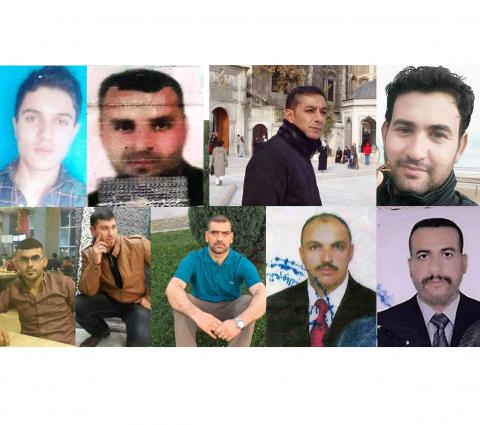
Clockwise from top left: Ahmad Al Jabouri, Bilal Al Bazi,Falah Al Bazi, Marwan Al Subaihi, Talib Al Jabouri, Shaker Al Mafraji, Ghassan Al Samarraei, and Dawoud Al Samarraie
(Geneva, August 14, 2018) – On August 3, 2018, Alkarama and Al Wissam Humanitarian Assembly submitted ten cases of missing persons in Iraq to the UN Committee on Enforced Disappearances (CED). This brings the number of cases submitted to the CED by the two organisations to 145, the vast majority of which have yet to be clarified by the authorities.
Seven of the ten disappearances – all of which took place between 2014 and 2015 – were carried out by militias affiliated with the Popular Mobilisation Units (PMU) at checkpoints in Samarra and Karbala. The PMU is an umbrella organisation composed of approximately 120 militias currently embedded in the Iraqi army. In March 2018, a decree issued by the prime minister’s office formally incorporated them into the country’s security forces. The remaining three victims were abducted either from their homes or at checkpoints by members of the 17th Brigade of the Iraqi army in Mahmoudiyah or SWAT Intervention Forces in Baghdad.
Enforced disappearances by the PMU in Samarra
On July 13, 2014, Falah Al Bazi, a 38-year-old metalsmith, and his cousin Bilal Al Bazi, a 42-year-old labourer, were travelling from Erbil to Samarra, where they reside. Due to an ongoing offensive against the Islamic State (IS), all entry points to the city were sealed off that day. As a result, Falah and Bilal were forced to take a road near the Rasasi River on the outskirts of Samarra. It was there that they were arrested at a checkpoint controlled by the Saraya Al Salam militia – also known as the Peace Brigades. Over the course of the day, members of Saraya Al Salam arrested around 300 civilians at the same checkpoint.
In October 2014, several individuals who were previously detained at the Muthana Airport Prison in Baghdad informed Falah’s and Bilal’s families that many individuals from Samarra were secretly held in the facility.
On June 25, 2015, Dawoud Al Samarraie, a 24-year-old labourer, along with his cousin Ghassan Al Samarraei, a 29-year-old labourer, were distributing food to displaced families from Al Abasia at the El Moutawakel Primary School in Samarra. While driving back home in Dawoud’s car, Dawoud and Ghassan were stopped by members of the Asa'ib Ahl al-Haq militia at a checkpoint. The militiamen then proceeded to arrest them and confiscate the car.
Enforced disappearances by the PMU in Karbala
On November 13, 2015, Marwan Al Subaihi, a 28-year-old law student, was traveling in a taxi from Rutba in Al Anbar to attend university in Baghdad, when he was stopped and abducted by members of the Hezbollah Brigades at a checkpoint in Razzaza, Karbala.
Similarly, on December 7, 2015, Hasan Al Muhmadi, a 41-year-old labourer, and his family were relocating from Al Anbar to another town due to the ongoing military campaign against IS, when they were stopped at a checkpoint run by the Hezbollah Brigades. While the officers arrested Al Muhmadi, they allowed the rest of his family to pass. They also seized a laptop and asked if they had any money or jewellery with them.
Over the course of the day, the Hezbollah Brigades abducted many other forcibly displaced individuals from the same checkpoint.
Enforced disappearances by other government forces
On May 21, 2014, at around 1:15 a.m., eight masked members of the SWAT Intervention Forces in military attire and driving military vehicles stormed the house of Ahmad Al Jabouri, a 25-year-old student, in Baghdad. They then proceeded to arrest him along with his relative Mekdad Khalaf Shehab, a 26-year-old labourer, who was visiting the family at the time.
A few days later, on June 4, 2014, the SWAT Intervention Forces also arrested Al Jabouri’s father – Ali Al Jabouri – whose case was submitted to the CED by Alkarama in 2015, but has still not been clarified by the authorities.
In a similar incident, on July 23, 2014, at around 10 p.m., Talib Al Jabouri, a 43-year-old labourer, was arrested from his home in Latifiya by armed and masked members of the 17th Division of the Iraqi Army in Mahmoudiyah dressed in military clothing. They then forced him to board a military vehicle and took him to an unknown location.
On August 26, 2014, Shaker Al Mafraji, a 40-year-old labourer, was arrested by the 17th Division of the Iraqi Army in Mahmoudiyah at a checkpoint on the Radwaniyah-Abu Ghraib International Motorway. Despite the soldiers telling two individuals travelling with Al Mafraji that they would “release him after questioning”, Al Mafraji has not been heard from since.
Following their disappearances, all the victims’ families made enquiries about their fates and whereabouts with various Iraqi authorities, including the Central Criminal Court, Baghdad Airport Prison and the Municipality Council of Samarra, but to no avail. All ten victims remain disappeared to date.
Alarmed by yet more cases of enforced disappearance in Iraq – the country with the highest rate of enforced disappearances worldwide – on August 3, Alkarama requested the urgent intervention of the CED to urge the Iraqi authorities to release all ten individuals or, at the very least, to bring them under the protection of the law and inform their families of their fates and whereabouts.
For more information or an interview, please contact media@alkarama.org (Dir: +41 22 734 1008).
